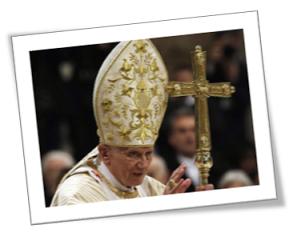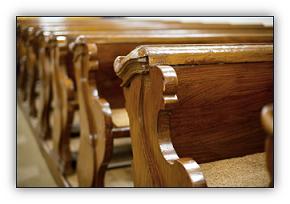The Confession of Faith Article 30 Concerning the Government of, and Offices in the Church
The Confession of Faith Article 30 Concerning the Government of, and Offices in the Church
The authority of the church rests exclusively in Christ, her Head. He exercises His authority immediately, but also by means. By His Spirit He works immediately in the hearts of His elect, but the Lord works also under the administration of Word and Spirit. For these means the Lord uses men – the office bearers who are called to this labor.
God is a God of order, as can be found in all His works. When David spoke of the Covenant of Grace, he might say that it is well ordered. The church is the house of the living God, and therefore it cannot be in disorder. The Lord did not give the task of office-bearers to angels, but to sinful men to fulfil His will. Thus they speak on behalf of the Lord, just as all ambassadors speak in the name of their senders. The office-bearers receive authority of the Lord not only to advise unto a departing from sin; no, it is more. They also receive authority to bind and to unbind, to acquit and to condemn.
This present article begins with the words, "We believe, that this true Church must be governed by that spiritual policy which the Lord has taught us in His Word." Disorder is immediately rejected, and everything is condemned which does not want to bow under the lawful government in the church. Paul wrote to the church of Corinth: "For God is not the author of confusion, but of peace, as in all churches of the saints." Later he wrote: "Let all things be done decently and in order."
This government of the church may not be arbitrary or founded on human institutions. The confession binds it to God's Word, as Christ, the Head of the church, has instructed. Christ received the promise of the church from eternity and in time He bought her with His precious blood to make them His possession. He gathers, protects and governs them. By the words 'spiritual policy' we must not understand the clergy. This word is unknown in the Bible. According to the Reformed doctrine, which can be proved from the Word, the church has its own domain and is distinguished from the state and all human societies. Because the church is distinguished, it must have its own government, which is in the hands of its Head. The authority of Christ is the authority in the church.
There are different opinions regarding how Christ executes this authority. Zwingli acknowledged that Christ was the Head of the church, but it was his opinion that this was entrusted to the government, which is the servant of God. He agreed that in the days of the apostles the church had its own government, but at that time there was not a Christian government. Since this is now changed, we are to give the power to the government. The Remonstrants had the same thought, which in 1816 was worked out by King William I in Holland.
The Antinomians and Remonstrants are opposed by Rome and the Reformed churches. But among those people and churches who believe that the church has received its own power and government, there is also considerable difference as to how this authority is to be executed. We will give a brief summary of their views.
1. Roman Catholic System⤒🔗
The Roman Catholic system pretends to comprise not only successors of the apostles, but also a successor of Peter. They say Peter had a primacy among the apostles and therefore his successor is recognized as the special representative of Christ. The church of Rome has an absolute monarchy under the control of an infallible Pope, who has the right to determine and regulate the doctrine, worship and government of the church. The people have absolutely no voice in the government of the church. This system conflicts with Scriptures, which recognize the voice of the people in ecclesiastical affairs. God's Word clearly speaks that Christ is the Head of the church, and not Peter. A body with two heads becomes a monster, and this has taken place with the church of Rome. She remains a great danger for the true church.
1. The Territorial or Lutheran System←⤒🔗
Luther thought that the border of a country also formed the border of the church. The territory of a country was therefore the territory of the church, and thus the name 'territorial system' was used. The king of each country is the most important member of the church and became the highest bishop. He not only decided in worldly things, but also church matters were entrusted to him, even though the Lord Himself has said that His kingdom was not of this earth.
1. The Congregational or Independent System←⤒🔗
According to this system each church or congregation is a complete church, independent of every other church. The governing power rests exclusively with the members of the church, and they are entitled to regulate their own affairs. The officers have no governing power beyond which they possess as members. Sometimes it is considered expedient that the various churches should exercise communion with one another, but the actions of the associated bodies are held to be strictly advisory and not binding on any particular church. This theory of popular government is certainly not in harmony with God's Word, and the independent system fails to express the unity of the Church of Christ.
 These are only a few of the many systems having differing opinions regarding the government of the church. Also in these things God is a God of order, and we are to live according to His will as it is revealed in His Word. Without being chauvinistic, I dare to say that the Reformed or Presbyterian system as it is used also in our denomination is founded upon the Word of God.
These are only a few of the many systems having differing opinions regarding the government of the church. Also in these things God is a God of order, and we are to live according to His will as it is revealed in His Word. Without being chauvinistic, I dare to say that the Reformed or Presbyterian system as it is used also in our denomination is founded upon the Word of God.
The government in other churches was explained in brief, but no doubt you would also like to know what it is in our denomination. Our form of church government is called The Reformed or Presbyterian System.
The Reformed churches do not claim that their system of church government is described in every detail by the Word of God, but they do assert that its fundamental principles are directly derived from Scripture. Let us briefly review its history. In the Old Testament times the authority was given by the Lord to the father, who was priest in his house. After the law was given, much authority was placed in the hands of the priests and Levites, and later, after the exile in Babylon, the Sanhedrin drew much power to itself.
In the New Testament church Christ gave much authority to the apostles, and later, according to the will of God, the offices of shepherd, elder and deacon were developed. According to the Reformed view, Christ has given the authority to the office-bearers, who rule on His behalf. The institution of the local church went out from Christ, Who called the believers to a regular church life. The apostle wrote to those Hebrews who were persecuted, "Not forsaking the assembling of ourselves together, as the manner of some is."
The Reformed principle of church government can be found in the Church Order. And in this article of our confession we read, "We believe that this true Church must be governed by that spiritual policy which our Lord has taught us in His Word; namely, that there must be ministers or pastors to preach the Word of God, and to administer the sacraments." Calvin originally made a difference between ministers and shepherds, but the synods which were later held have taken these two names as one and the same office. In fact the office of minister is not different than that of elder, as Paul said, "Let the elders that rule well be counted worthy of double honor, especially they who labor in the Word and doctrine." In those days some of the elders defended and preached the Truth, while the majority took care of the church government.
The special task of the ministers is to preach and to administer the sacraments. There is not a more important work than to be called by the Great Shepherd Himself and to be qualified by Him to tend the flock of God. "How beautiful upon the mountains are the feet of him that bringeth good tidings, that publisheth peace." It is necessary to be called to this office. In our days many become ministers without a calling to this office. In most of the churches anyone can become a minister, but practice shows us that it is not a solution and God's Word clearly states that we must be called as was Moses.
In our denomination we have the curatorium, which listens to the candidate for the ministry on behalf of the church. This begins and ends with prayer, asking for God's leading in the decision to be made. I do not say it is perfect, but we feel it is the best way for this while seeking the honor of God and the welfare of the church. Especially when we see all of the vacant congregations, we must realize the great need. We hope this may be bound upon the hearts of many, especially those who have learned to pray.
This article also speaks of the elders, or presbyters, which means eldest. "Also elders and deacons, who, together with the pastors, form the council of the church." The apostles preached and took care of the poor, but then Acts 6 describes how seven deacons were chosen. Elders with the minister have the oversight of the church, but the elders must also oversee the minister in his doctrine and life.
Some wish to infer from Romans 16:1 that women have been deacons in the church. This would be a contradiction with God's Word, which says that women are to be silent in the church. No, these women did not have an office in the church, but we believe that there were those who served the church. Today we might call them social workers, or midwives and nurses, who worked for the deacons and helped the sick and needy.
At times you hear wrong thoughts about the office of deacon, as if it were not so important. It is said that an elder must be converted, but as deacon this is not necessary; he must only be a respected person in the congregation. According to God's requirement, none may be unconverted, and that is also applicable for a deacon. The third question in the form of ordination of elders and deacons reads, "Whether ye promise, agreeably to said doctrine, faithfully, according to your ability, to discharge your respective offices, as they are here described? Do ye also jointly promise to walk in all godliness?" Further in the form we read: "Be ye all with one accord faithful in your offices, and hold the mystery of the faith in a pure conscience, being good examples unto all the people."
 How necessary it is for the churches to receive men as described in that form. We often pray for ministers, and it truly is a great need, but isn't it the same for other office-bearers? We should not forget this in our prayers, and we hope that the Spirit of prayer may give this in our midst. "That by these means the true religion may be preserved, and the true doctrine everywhere propagated." It is necessary that the whole consistory realize this, and that all must be done with the help of the Lord.
How necessary it is for the churches to receive men as described in that form. We often pray for ministers, and it truly is a great need, but isn't it the same for other office-bearers? We should not forget this in our prayers, and we hope that the Spirit of prayer may give this in our midst. "That by these means the true religion may be preserved, and the true doctrine everywhere propagated." It is necessary that the whole consistory realize this, and that all must be done with the help of the Lord.
We must not forget that we have to do with men, who also have shortcomings. When we know ourselves, then we can be patient with others. Our article concludes with these words, "By these means everything will be carried on in the church with good order and decency, when faithful men are chosen, according to the rule prescribed by St. Paul in his Epistle to Timothy."
May the Great Office-bearer, Jesus Christ, remember us in His mercy and grace.

Add new comment